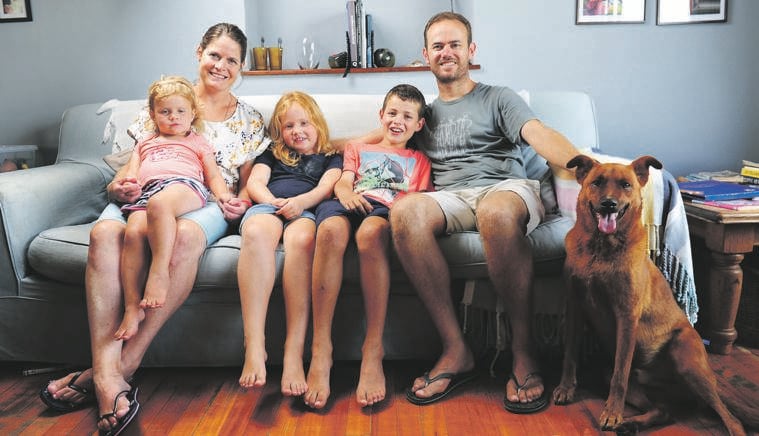
The outbreak of the Covid-19 coronavirus and the subsequent lockdown will have far-reaching consequences for many households. Even before this crisis, people found it hard to make ends meet, as salaries failed to keep up with the cost of living. This leads to the slippery slope of credit dependency.
Hashtags: #MoneyMakeover; #CPMoneyMakeover or #JourneyToFinancialFreedom
Facebook: @CPMoneyMakeover
Twitter: @CPMoneyMakeover
Instagram: @city_press
When Peter gave up his well-paid corporate job to join a start-up, he didn’t realise how much he really needed to live on.
“I hadn’t taken into consideration all the perks of my corporate salary – the medical aid, car allowance, retirement contributions and bonuses.”
Once his start-up’s salary failed to meet the family’s expenses, Peter drew on his savings and retirement fund. Once the retirement fund had dried up, he began to make ends meet by using his credit card.
He kept hoping the business would take off and he could draw a better salary but eventually Peter had to face the reality that the business could no longer sustain him. As he was unable to get back into the corporate world, he found work as a consultant providing a regular income, yet Peter found he was still falling deeper and deeper into debt.
Read more about the Money Makeover candidates
“You keep getting calls from the bank offering you more credit on your card and it is such an easy thing to do. You pay a bit in but then you spend a bit more and end up in a situation where you are close to your maximum limit. It’s incremental, it is not something that just goes ‘boom’. If they had said, ‘Do you want to take out R60 000 credit at 18%?’ I would have said, ‘No way.’ But it’s those incremental credit line increases, and then you suddenly realise you have no options left,” says Peter.
How to kill that credit card debt
The couple decided to buy a high-value car from a friend who was moving abroad as it was “such a great deal”. Although finances were tight, they drew down on their mortgage to pay for the car. The belief was that they would increase their mortgage repayments to pay off the car over a shorter period. In actuality they simply kept with the minimum mortgage payment, effectively financing the car over 18 years.
Until they joined Money Makeover and met with their Absa financial adviser, Leighanne Decker, they had never assessed their real budget shortfall. The couple were shocked to discover that they were spending R5 000 more a month than they earned.
This explained Peter’s confusion as to why, no matter how much they seemed to pay into their credit card each month, the balance just continued to grow.
The couple could not understand why they were falling into debt when they looked at what other people around them were doing.
“Our lifestyle was nowhere near other people’s. We do not go out for dinner or buy expensive clothes. We live a modest life. We kept wondering: What are they doing that we are not? What are we missing?” says Helen.
When we look at other people and wonder how they are managing when times are so tough for us, we miss the fact that most of our neighbours are maxing out credit lines to stay afloat. An expensive car with high finance charges does not mean you are wealthy.
Don’t get caught in the comparison game. Focus on your own financial fitness.
“More clients are starting to finance those last couple of days in the month via credit. That is becoming more prevalent as disposable income reduces as the cost of living increases. Instead of cutting the bills and strict budgeting, they use easy credit,” says Decker.
Peter and his wife, Helen, are taking stringent steps to turn their finances around. They have managed to make further budget cuts by sticking to strict meal plans and cutting back on their kids’ extra mural activities.
“Even if there is a 30% discount special at the grocery store, if it is not on the meal plan, we don’t buy it,” says Helen. However, the budget cuts have not been enough to put a significant dent into their credit card spend. Decker reviewed all their options and recommended they sell their endowment investment.
“The fund had not been performing and Peter was paying far more interest on his credit card than he was making from the investment. I was also concerned that Peter had no access to an emergency fund.”
As the policy was past its restriction period of five years, Peter could withdraw the funds without a penalty. (Note: This was done earlier in the year, prior to the market crash. Decker says she would not make the same recommendation now, as Peter would have locked-in market losses.)
The credit card account has been settled and funds have been put into an emergency fund.
The R5 000 that was going to the credit card is now helping the couple meet their budget shortfall.
“For the first time in years we actually have money left at the end of the month,” says Peter.
What to do if you have a salary squeeze
>> Draw up a proper budget so you understand what it really costs you to live. This is not what you think you spend, but what you really are spending. Adjust immediately, do not wait for “things to get better”. Rather make the cuts now and, if the situation improves, you have extra cash.
>> Be careful of using your mortgage as easy credit. You may think you will pay it back, but, in most cases, you end up financing short-term needs over 20 years.
>> Make budget cuts rather than cashing in your retirement funds. Peter has set back his retirement fund significantly and will have to consider working well beyond his retirement date.
>> Ensure you have liquidity in the form of an emergency fund, but do not sit with money idle in a bank account when you have expensive debt to pay off.
>> If you are retrenched, write up a survival budget and see how long you can stretch your payout. If you find work easily, that is a bonus, but do not rely on that happening. Make use of all your benefits. Register with the Unemployment Insurance Fund and lodge a claim for retrenchment benefits provided in your credit life policies. Many loans and even credit cards have credit life insurance that you have been paying for. Many insurance policies have premium waivers so you can keep your insurance going.
>> Do not lapse on insurance. Having a car accident after lapsing your policy would be a death blow to your finances. Rather look at restructuring your life cover than cancelling it altogether.
>> Find ways to earn a bit of extra money with a side business rather than thinking of your retirement fund as your safety net.
Follow six South Africans as they take up the Absa and City Press Money Makeover Challenge and undergo a money makeover boot camp over the next six months.
Each person has been allocated an Absa financial adviser. The candidates will be required to complete certain financial tasks and stick to the budgets set out for them.
Personal finance expert Maya Fisher-French shares their stories.




 Publications
Publications
 Partners
Partners








